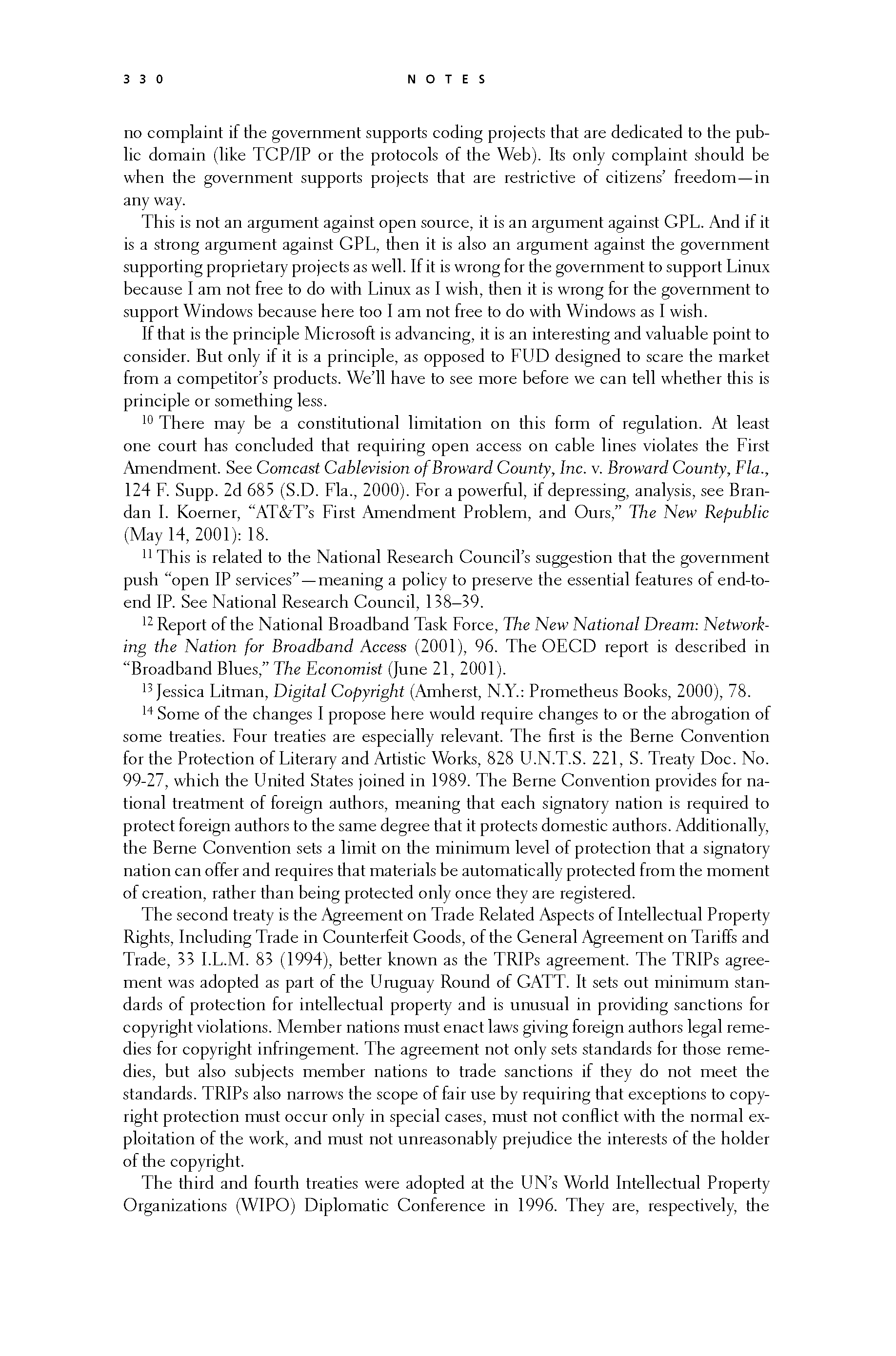 p329 _
-chap- _
toc-1 _
p330w _
toc-2 _
+chap+ _
p331
p329 _
-chap- _
toc-1 _
p330w _
toc-2 _
+chap+ _
p331
no complaint if the government supports coding projects that are dedicated to the pub-
lic domain (like TCP/IP or the protocols of the Web). Its only complaint should be
when the government supports projects that are restrictive of citizens' freedom -- in
any way.
This is not an argument against open source, it is an argument against GPL. And if it
is a strong argument against GPL, then it is also an argument against the government
supporting proprietary projects as well. If it is wrong for the government to support Linux
because I am not free to do with Linux as I wish, then it is wrong for the government to
support Windows because here too I am not free to do with Windows as I wish.
If that is the principle Microsoft is advancing, it is an interesting and valuable point to
consider. But only if it is a principle, as opposed to FUD designed to scare the market
from a competitor's products. We'll have to see more before we can tell whether this is
principle or something less.
[14-10] There may be a constitutional limitation on this form of regulation. At least
one court has concluded that requiring open access on cable lines violates the First
Amendment. See _Comcast_Cablevision_of_Broward_County,_Inc._ v. _Broward_County,_Fla.,_
124 F. Supp. 2d 685 (S.D. Fla., 2000). For a powerful, if depressing, analysis, see Bran-
dan I. Koerner, "AT&T's First Amendment Problem, and Ours," _The_New_Republic_
(May 14, 2001): 18.
[14-11] This is related to the National Research Council's suggestion that the government
push "open IP services" -- meaning a policy to preserve the essential features of end-to-
end IP. See National Research Council, 138-139.
[14-12] Report of the National Broadband Task Force, _The_New_National_Dream:_Network-_
_ing_the_Nation_for_Broadband_Access_ (2001), 96. The OECD report is described in
"Broadband Blues," _The_Economist_ (June 21, 2001).
[14-13] Jessica Litman, _Digital_Copyright_ (Amherst, N.Y.: Prometheus Books, 2000), 78.
[14-14] Some of the changes I propose here would require changes to or the abrogation of
some treaties. Four treaties are especially relevant. The first is the Berne Convention
for the Protection of Literary and Artistic Works, 828 U.N.T.S. 221, S. Treaty Doc. No.
99-27, which the United States joined in 1989. The Berne Convention provides for na-
tional treatment of foreign authors, meaning that each signatory nation is required to
protect foreign authors to the same degree that it protects domestic authors. Additionally,
the Berne Convention sets a limit on the minimum level of protection that a signatory
nation can offer and requires that materials be automatically protected from the moment
of creation, rather than being protected only once they are registered.
The second treaty is the Agreement on Trade Related Aspects of Intellectual Property
Rights, Including Trade in Counterfeit Goods, of the General Agreement on Tariffs and
Trade, 33 I.L.M. 83 (1994), better known as the TRIPs agreement. The TRIPs agree-
ment was adopted as part of the Uruguay Round of GATT. It sets out minimum stan-
dards of protection for intellectual property and is unusual in providing sanctions for
copyright violations. Member nations must enact laws giving foreign authors legal reme-
dies for copyright infringement. The agreement not only sets standards for those reme-
dies, but also subjects member nations to trade sanctions if they do not meet the
standards. TRIPs also narrows the scope of fair use by requiring that exceptions to copy-
right protection must occur only in special cases, must not conflict with the normal ex-
ploitation of the work, and must not unreasonably prejudice the interests of the holder
of the copyright.
The third and fourth treaties were adopted at the UN's World Intellectual Property
Organizations (WIPO) Diplomatic Conference in 1996. They are, respectively, the
[[330]]
p329 _
-chap- _
toc-1 _
p330w _
toc-2 _
+chap+ _
p331